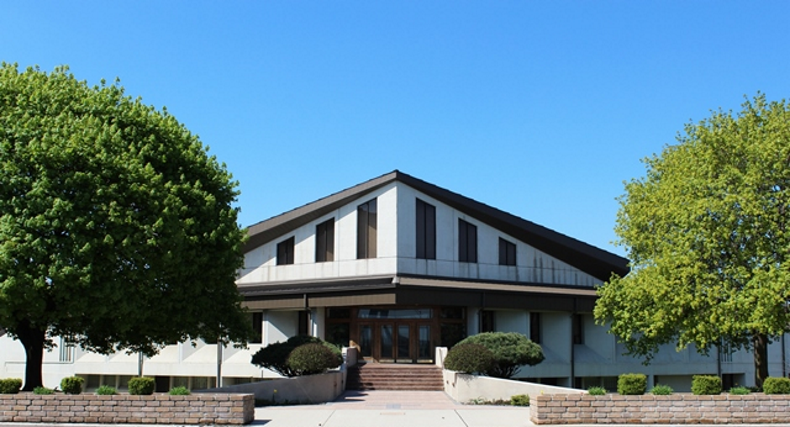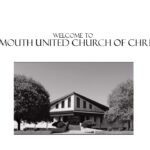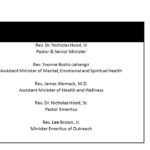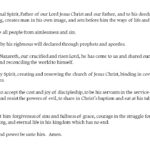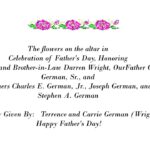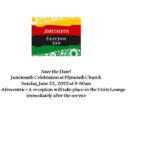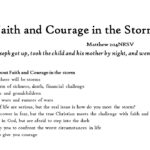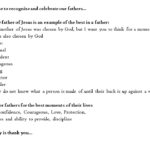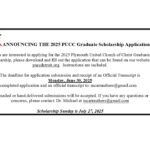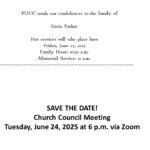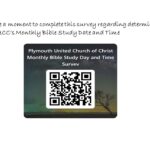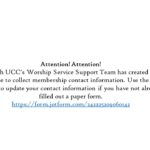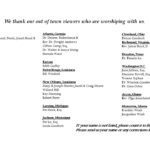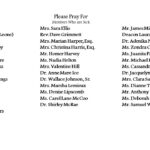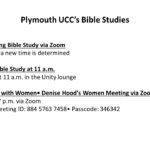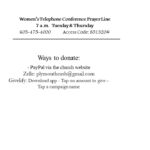History of Plymouth United Church of Christ
Denominational Roots
A YouTube video history of our church
Produced by Rev. Nicholas Hood, Sr.
The Congregational Church, arising within English Puritanism and believing in the autonomy of each congregation, broke from the Anglican Church late in the Sixteenth Century. The Pilgrims who settled the Massachusetts Bay Colony extended this faith until it became the established religion of most of New England. Congregationalism moved to Michigan in 1844 when a small group of men and women, the First Congregational Society of Michigan, occupied two buildings near the Detroit River and later moved to the corner of Forest and Woodward in 1891, becoming the First Congregational Church.
The new denomination established many schools, the first being Harvard University in 1636. Committed to the Abolitionist Movement, it supported schools and colleges for freed slaves, including Fisk, Dillard, LeMoyne-Owens, Houston Tillotson, Talladega and Tougaloo, institutions of higher learning that still survive. Out of this tradition African American graduates migrated to Detroit during World War I and played a major role in the history of Plymouth Congregational Church.
The United Church of Christ is a merger of the Congregational Church with the Evangelical and Reformed Church-itself a merger of Eighteenth Century German settlers fleeing religious oppression in Europe and German and Swiss refugees of the Seventeenth and Eighteenth centuries opposing political and military oppression.
The Founding of Plymouth
On May 4, 1919, nine persons, former Alabama Congregationalists led by Edward M. Dale, met in the home of Mrs. Carrie L. Thompson at 620 Melbourne Street to organize the first black Congregational church in Michigan. Later that month, officers were elected, and by July, a Notice of Organization had been written. On April 6, 1920, “Plymouth Congregational Church” came into being through its charter members:
Deacon Edward M. Dale, Mrs. Carrie L. Thompson, Mrs. Alixe Harris, Mr. M.C. Graham, Mr. L.C. Farley, Mr. Joseph Shannon, Miss Thelma Benjamin, Mrs. Thomas Benjamin, and Mr. M. Stewart Thompson. The first meetings were held at various residences and the first public worship services on Sunday afternoons in the First Congregational Church.
Early Leadership
Rev. William W. Speights, the first minister, served from early July 1919 until the end of the year. Visiting ministers lead the worship for the next several months. The Home Missionary Association of New York City sent the Rev. Harold M. Kingsley to Detroit to survey the needs of the church during the spring and summer of 1920; William Jones, a seminary student, assisted him. As a result, two small buildings were purchased on the corner of St. Aubin and Antietam streets to serve as church and parish house. They were occupied on September 13, 1920; during the same month, Rev. Kingsley’s assistant, succeeded him as pastor until December 31, 1923.
A Change of Scene
Early in 1924, the Rev. S. L. Laviscount came to Plymouth as guest minister, his role as pastor becoming official on March 1. The two buildings were sold around September 1925 and services were held in rented space in a Masonic temple at 632 Livingstone Street while a search for a permanent location ensued. Rev. Laviscount noticed a synagogue on the corner of Garfield and Beaubien streets, which he felt, would be an ideal home for Plymouth. On inquiry, he found that this property was for sale. The building was acquired on March 10, 1927, and the congregation occupied it on May 15 of that year, remaining for 47 years.
Following Rev. Laviscount’s resignation, effective on September 30, 1928, the church Moderator, Mr. H. S. Dunbar, served as temporary minister. The Rev. A. T. Peters was elected in the fall of 1928 and served until October 1931. Again Mr. Dunbar filled in until the election of Rev. W. H. King, who was pastor until 1934. For the next two years, the moderator served. The Depression years were so severe that a “Coal for Plymouth” campaign was launched to raise money for operating expenses.
Rev. Horace A. White
In February 1936, the Rev. Horace A. White began a fruitful and highly progressive ministry at Plymouth but not without problems. Two months after a new organ was dedicated in July 1936, the bank foreclosed on the mortgage. Following litigation, the mortgage was bought back on December 4, 1937. During Rev. White’s administration, he held political office while initiating numerous church programs and services that benefited both the membership and the larger community. His popularity and strong leadership led to a marked growth in membership. Following Rev. White’s death on February 10, 1958, the Rev. Edgar Flood, a local minister who had assisted during his illness, became temporary pastor.
Rev. Nicholas Hood, II
The Rev. Nicholas Hood, II was elected pastor in June 1958. His leadership began officially on September 1 and ended with his resignation on July 1, 1984. The multitude of new programs and services which he initiated; his support and continuation of work begun by the previous minister; his social and political ministries outside the church; his leadership in the building of a community of new housing in the Medical Center; his pioneering in mental health facilities; and the willingness of the church to share him with the larger community raised Plymouth to new heights as a leader and vital force in the city. He is the only leader in the history of the church to be elected minister emeritus, a lifetime title of honor.
A Time of Challenge
Shortly after Rev. Hood’s arrival at Plymouth, the church was severely damaged by fire on December 6, 1958. Services were held at Durfee School at 2470 Collingwood Street until April 1959 when the congregation returned to the renovated building. During that year a parsonage was purchased and occupied, and the Horace A. White Halfway House, which had been purchased earlier, was renovated and put into use for youth and community programs.
A New Era
Forced by the city to vacate its premises because of the development of the Medical Center, Plymouth decided to remain in the same community. On June 4, 1972, groundbreaking services were held for the new structure at 600 East Warren Avenue. The last day of worship at 514 Garfield Avenue was March 17, 1974, and on March 24, members, singing and accompanied by a band, marched to the new edifice for the first service, held on the lower level because the sanctuary had not been completed. Dedication services were held November 24-29. Because of the composition of the poured-concrete building and the shortage of funds, no cornerstone has been laid. On November 29, 1998, a “cornerstone” ceremony was held, at which time a bronze plaque was permanently affixed to the exterior of the building. A second plaque, listing the names of all who contributed to this project, was installed on an entrance wall.
New Leadership
After his father’s resignation, Rev. Nicholas Hood, III was elected interim minister on August 12, 1984. Following a nationwide search, he was overwhelmingly elected senior minister on March 17, 1985 and installed June 9. Under his leadership many new members have joined the church, and the involvement of young people has increased. His outlook has been ecumenical, and he has borrowed from other denominational practices and introduced a return to racial roots through such practices as annual revivals, voluntary baptism by immersion in the Detroit River, African-centered Maundy Thursday services, and the laying on the hands during the altar call for prayer. In August 2000, the Plymouth Educational Center began classes in its new building at 1469 East Forest Avenue with Dr. Vivian H. Ross as its director. It now has more than 800 students enrolled.
Assistant and Associate Ministers
Although the Rev. Archie Epps had earlier aided during one summer, it was not until the Sixties that the senior minister was provided official assistance. Following Rev. Cameron Byrd, Rev. Roger Miller became associate minister on February 9, 1966, serving until 1976. Rev. A. Knighten Stanley became the second associate minister on February 9, 1966, serving until 1976. Rev. G. Wesley Raney, who served until 1976, followed him. On June 1 of that year, Rev. Nicholas Hood, III was elected assistant minister for one year, and on January 31, 1978, he was elected associate minister. After serving as a mission fellow, Rev. Pamela Anderson in 1986 became the first woman in the history of the church to be elected associate minister. She remained until August 1989. Rev. Lee Brown was elected assistant minister of outreach on June 23, 1991. His duties involved coordinating the nursing home, prison, and juvenile ministries, organizing Christmas gift giving and Thanksgiving baskets, and representing the church on various boards. His service to the sick and shut-in and his counseling of individuals and families in crisis was and continues to be indispensable.
Assuring Continuity
Throughout its eighty-five years, but particularly under the leadership of the last two senior ministers, Plymouth has been a source of spiritual support and encouragement for numerous persons who have heeded the call to the ministry. The list of sons and daughters of Plymouth who have been ordained is long and impressive.
Parallels in Community Outreach
While some believe that ministers should confine their duties to the spiritual needs of the church, Plymouth’s leadership has recognized that saving souls also involves addressing the secular needs of the larger society. Nowhere has this been more apparent than in the civic and political involvement of its most recent senior ministers.
Rev. Horace A. White served on the Michigan Legislature for two years, was a member of the Wayne County Board of Supervisors, and was president of the Detroit Housing Commission. Rev. Nicholas Hood, II served as national chairman of the denomination’s Committee for Racial Justice Now in 1963. He was the second African American to be elected to the Detroit City Council, a position he held for 28 years. In the process of constructing the first low to moderate income housing in Detroit since World War II, beginning with Medical Center Courts (occupied in 1967), he led the move that forced the Building Trades Council through court action to open its membership to African American professionals. His leadership in providing care and training for the mentally handicapped began with the completion of Cyprian Center in 1975, followed by several other similar facilities.
Rev. Nicholas Hood, III has continued this tradition. Elected to Detroit City Council in 1995, he served two years as president of the Booker T. Washington Business Association and was secretary of the Interdenominational Ministerial Alliance and a member of the executive board of the Greater Detroit Chamber of Commerce. He continues to serve the community through membership in numerous civic organizations. His leadership has extended the church’s missionary outreach to include a personal relationship with several African nations.
1999-2004
Following the vision of our pastor, Rev. Nicholas Hood III, the ministry at Plymouth has developed in a unique manner. In 2000, Rev Hood asked the church to extend a call to Christian Ministry to Georgia Hill, a recent graduate of McCormick Seminary in Chicago and a long time member of Plymouth as Associate minister. Rev. Hill currently oversees the Christian Education department of the church and assists Rev. Hood with pastoral responsibilities. Additionally, Rev. Hill has led a Friday evening Praise and Worship service and has created a spiritual dance group known as Revelation Dance Ministry. Rev. Hill provides administrative pastoral leadership in the absence of Rev. Hood.
In 2002, Rev. Hood proposed that the church extend a call to the Christian Ministry to Pamela Hill Clausen Hines. Like Rev. Hill, Rev. Clausen Hines grew up at Plymouth she received her seminary training at Ashland Theological Seminary Her specific ministry is Family Life. Although in October of this year she relocated to Phoenix Arizona with her family, Rev. Hines has made a positive impact through the Sunday School.
In June of 2004, Rev. Hood preached the ordination sermon for Dr. James Womack, a graduate of McCormick Seminary who was ordained and called as Assistant Minister of Health and Wellness. A trained medical doctor, Dr. Womack grew up at Plymouth and has been active for a number of years. In his pastoral capacity, Dr. Womack is responsible for the creation of health awareness at the church. Each Sunday, Dr. Womack oversees the participation of other health professionals as they share “healthy moments” during the announcement section of the church service. Dr. Womack is the first assistant minister at Plymouth to be called under an “Ordination Residency,” program that provides a one-year, unpaid residency where a recent seminary graduate works with the senior pastor and is exposed to various aspects of the ministry.
Rev. Lee Brown is the Assistant Minister for Outreach at Plymouth. Rev. Brown oversees several outreach programs such as homeless ministries, Thanksgiving and Christmas outreach, Habitat for Humanity, the summer camp for boys and girls and much more. Rev. Brown also assists with visitation of the sick. Rev. Brown also oversees a Nursing Home Ministry that involves over 80 members of the church each month.
Altogether, seven persons have been ordained into the Christian Ministry during the 20 year tenure of Rev. Nicholas Hood III as pastor of Plymouth: John Long, now pastor of Tubman King UCC in Daytona Beach, Florida; Leslie Taylor; Melvin Parker, an associate pastor in Detroit; David Grimmett, pastor of a new church start in Detroit; Georgia Hill, Pamela Clausen Hines; James Womack. One of the unique features of the current pastoral team at Plymouth is each minister, including Rev. Hood either grew up at Plymouth or has attended Plymouth most of their life. This provides Plymouth with an unusual continuity of pastoral leadership.
It was also in this period under Rev. Nicholas Hood III’s pastorate, leadership and encouragement that the Plymouth Day School and Plymouth Day Care Center transitioned into the Plymouth Educational Center, the first charter school in Michigan to build a new 12 million dollar building from the ground up. The school now has an enrollment of 800 students. A non-profit board of directors governs the school with the majority of its members belonging to the church. The school honored its former executive director, by naming the current campus the Vivian Ross Campus.
The Medical Center Courts Apartments was renamed the Nicholas Hood Sr. Medical Center Courts. The renaming of the housing is a personal testimony to the love and appreciation the church has for its esteemed pastor emeritus and the effort he gave in developing 43 acres in the medical center area that insures that low and moderate income persons can live in the community. The Plymouth Non Profit Housing Corporation is the co owner of the medical center courts with HUD.
In the last several years, Plymouth has reaffirmed its commitment to the Cyprian Center for the mentally handicapped, by providing human capital, and upgrading of the physical facilities. The Cyprian Center and the Plymouth Non Profit Housing Corporation are governed by a majority of church members.
In 1997, 1999 and 2004, the church has participated in missionary trips to Africa. In 1997 and 1999, Rev. Hood was accompanied by several lay members to provide assistance to Liberian refugees of war in Cote D Ivoire. Plymouth Member, Dr. Johnston Tweh, led this mission. In October of this year, Rev. Hood accompanied Plymouth Member, Dr. Ingida Asfaw on a medical mission to Ethiopia. The Plymouth membership has supported each of these missions with substantial financial contributions.
Two years ago, Rev. Nicholas Hood III decided to bridge the digital divide in our community by providing free computers to neighborhood youth who demonstrate at least a 3.0 grade point average established a computer mission in memory of Marie and Greg Moses. In its first year 20 youth received computers. It is projected that a similar number of youth will benefit this year.
Renovation of the Church
Under the leadership of Rev. Nicholas Hood III, the Trustee board has studied for the last two years a concept of renovating the lower level and much of the upper level of the church. After an exhaustive search process, Mark English was selected as the architect to design the project. Estimated to cost 1.1 million dollars, this effort will finish the unfinished portions of the church- providing the church with a first rate, modem banquet and meeting space as well as a new kitchen, lounge, Haley Bell Chapel. The congregation in August of 2004 approved financing for the renovation. Construction should begin this fall.
Prior to the renovation, the church has made major capital improvements to the heating and cooling system, the sound system, furnishings and fixtures.
Spiritual Realm
Our church now has five choirs: The Renaissance Choir, Blended Voices, Gospel Choir, Total Praise and Children’s Choir. Additionally, on special Sundays, the male and female voices sing separately.
Ten years ago, Rev. Hood III took the United Church of Christ tradition of infant baptism to another level by offering immersion of adults in the Detroit River. This event is well attended and many have given their lives to Christ in this manner.
Rev. Hood encourages each of the ministers on staff to teach at least one Bible Class. Our church now offers Bible studies on Monday, Tuesday, Wednesday, and Saturday of each week, and a Southfield Bible Study as well.
In 2004, Rev. Hood asked Doris Parker to serve as chair of a new ministry to bereaved families known as the Consolation Ministry. Several individuals are a part of this vital ministry that is making a difference in many lives.
The Wednesday Noon Worship Service is a new Ministry of Rev. Nicholas Hood III that provides a brief, spirit filled worship service with exceptional music, dynamic preaching and a light lunch to follow. This new worship service is growing in a wonderful way.
Marriage and Singles Ministries at Plymouth: For the last several years, Rev. Hood and his wife, Denise have given personal leadership to marriage ministries which includes in-church seminars and the out of town “Weekend of Romance.” This year, Rev. Hood is organizing “Faith, Hope, Love Single Summit 2005” which will be unveiled in the newly renovated lower level of the church.
Plymouth is making a difference in the lives of not only its membership, but also the community at large. Worship continues to be spirit filled and spirit led through the insightful, up lifting messages of Rev. Nicholas Hood III. Plymouth United Church of Christ truly is a witness of faith, a history of service and a legacy of love.
A Look Into the Future
While history tends to record the name and contributions of elected officials, it is the members and organizations and their many contributions in time, service, and financial support that make the church what it is. Many members remember loved ones through memorial gifts to a foundation set up to ensure the future programs of the church. In addition, the membership has a record of increasing support of youth through scholarships. The continuing efforts of the various organizations, officers, members, and friends are the real foundation of the church and the main reason that we can now give thanks through the present celebration.
The history of Plymouth United Church of Christ continues. Let us rejoice for the eighty-five years of our illustrious history and pray that we many continue on, for indeed, “We’ve Come This Far By Faith.”
